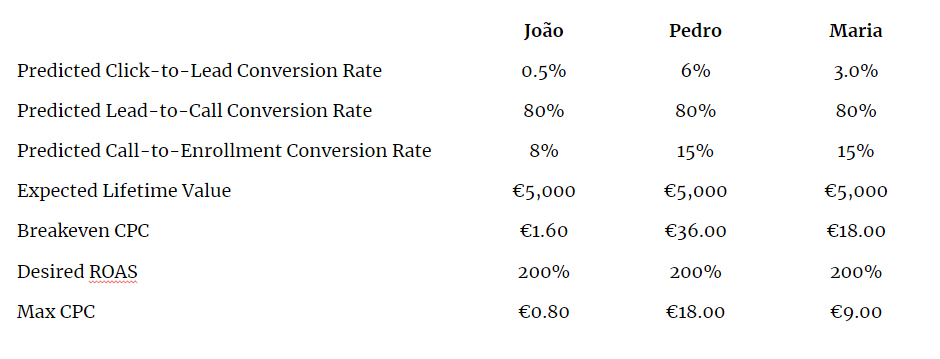By Nuno Duarte
Before we dig in, it’s really important to shift our mindset and keep the following in mind while you read this post:
“Not all conversions are created equal, not all leads are created equal, not all customers, even if they purchased the exact same item on the exact same day, are created equal.”
With that in mind let’s begin with this simple and logical question — What’s the problem with average CPCs?
The answer is quite simple and brings us to the beginning of this article. Averages don’t tell you the whole story. They fail to recognise that every google search, every individual and every customer, is unique.
Imagine an e-commerce store. Setting marketing goals and making forecasts on the individual profit margin of every single product is extremely hard and requires a huge amount of time so, all marketing goals and forecasts are created around average profit margins.
The same happens for Keyword Bidding. In the PPC area, we are used to the idea that we should take our profit margins and work backwards through our conversion rates to set our CPCs.
Say we are an online marketing school and want to use paid search ads to drive leads for our new Growth Marketing Degree.
For each new enrollment we get an LTV of 5000€. Our Profit Margin Goal is 50% which means that our ROAS Goal is 200% and our Target CPA is 2500€. Easy and simple math, right?
Now, going into our paid search campaigns and focusing on Bottom-Funnel Search Keywords we have an average Click-to-lead conversion rate of 2% on the site but, we have to take into account that a lead doesn’t necessarily mean a new enrollment. We have a sales process to be factored into the equation.
Let’s say our sales team can successfully reach 80% of leads by phone, which means we have an average Lead-to-Call conversion rate of 80% and 15% of calls turn into successful enrollments, which means, if we do the math, our target Average CPC is 6€.
Now, back to the beggining of this post. Remember the quote?
“Not all conversions are created equal, not all leads are created equal, not all customers, even if they purchased the exact same item on the exact same day, are created equal.”
If that’s the case and even though the Average CPC of 6€ is correct, why should we be bidding on groups of people instead of bidding on singular and unique individuals?
Meet our players
Let’s take a look at the following potential customers for the Growth Marketing Degree.
João is 17 years old and is finishing high school. He is considering which steps to take next on his education path and he runs a tech blog which is already making some profit through advertising. He also participates in several IT and technology forums and is always looking for tips and tricks to maximize his profitability with his own blog.
Pedro is 26 years old, works as a Performance Marketing Manager on a B2B company and is actually facing some challenges when trying to improve his lead base quality and, consequently, scale the profit of the company. He also reads a lot of Marketing Blogs and is passionate about growth hacking. He’s already done some courses and during the last year he also bought several marketing and growth hacking books.
Maria is 30 years old and runs an online store. She started investing in advertising a few months ago and is actively searching for more information to learn and make her business more profitable. In the last 2 months she has completed several basics courses from Google Skillshop and started following some “how to” marketing youtube channels.
Even though they all searched for “Online Growth Marketing Course”, they have really different Intent and Predicted Conversion Rates. Let’s translate it into numbers.

As you can see, if you set an average CPC of 6€ we will be overpaying João’s click and we will not bid enough for Pedro and Maria, which means we will not be competitive in the auction, reducing our chances to get two value prospects into the pipeline!
That’s the problem with averages and manual CPC. Without automation, machine learning and a whole lot of data, we bid more or less aggressively according to the intent underneath the search term. Nowadays, we can unlock an uncountable number of signals going way beyond the search term and all we need for that is a bit of automation.
While this is incredibly powerful, you still have to keep in mind that to start using automation, you need to teach the algorithm how to work — feeding the machine with good data and. in most cases, start with “traditional” performance marketing.
All these insights and learnings were taken from the incredible book “Join Or Die: Digital Advertising in the Age of Automation “ by Patrick Gilbert.

